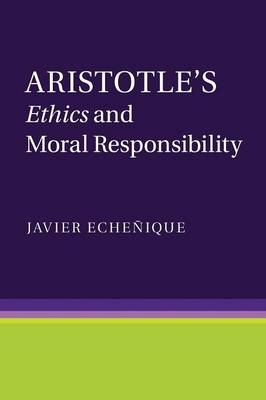
Aristotle's Ethics and Moral Responsibility
Seiten
2015
Cambridge University Press (Verlag)
978-1-107-49965-2 (ISBN)
Cambridge University Press (Verlag)
978-1-107-49965-2 (ISBN)
Echeñique argues that Aristotle developed an original and compelling theory of moral responsibility and contributed in novel ways to our understanding of coercion, ignorance and violence. Of interest to students and academics interested in ancient ethics, as well as those interested in moral responsibility and criminal liability more broadly.
Aristotle's Ethics develops a complex theory of the qualities which make for a good human being and for several decades there has been intense discussion about whether Aristotle's theory of voluntariness, outlined in the Ethics, actually delineates what modern thinkers would recognize as a theory of moral responsibility. Javier Echeñique presents a novel account of Aristotle's discussion of voluntariness in the Ethics, arguing - against the interpretation by Arthur Adkins and that inspired by Peter Strawson - that he developed an original and compelling theory of moral responsibility and that this theory has contributed in important ways to our understanding of coercion, ignorance and violence. His study will be valuable for a wide range of readers interested in Aristotle and in ancient ethics more broadly.
Aristotle's Ethics develops a complex theory of the qualities which make for a good human being and for several decades there has been intense discussion about whether Aristotle's theory of voluntariness, outlined in the Ethics, actually delineates what modern thinkers would recognize as a theory of moral responsibility. Javier Echeñique presents a novel account of Aristotle's discussion of voluntariness in the Ethics, arguing - against the interpretation by Arthur Adkins and that inspired by Peter Strawson - that he developed an original and compelling theory of moral responsibility and that this theory has contributed in important ways to our understanding of coercion, ignorance and violence. His study will be valuable for a wide range of readers interested in Aristotle and in ancient ethics more broadly.
Javier Echeñique is an Associate Professor at the Centre of Classical Studies (UMCE) in Chile and a lecturer at the Department of Philosophy, Universidad de Chile. He holds a B.A. in Philosophy from the Pontifical Catholic University of Chile, an M.Phil in Philosophy from King's College London and a Ph.D. in Philosophy from the University of St Andrews.
Introduction; 1. Against the Strawsonian interpretation: the negative argument; 2. Aristotle on ethical ascription: the positive argument; 3. The definitions of violence; 4. Coercion as justification and excuse 1: the Ethica Eudemia; 5. Coercion as justification and excuse 2: the Ethica Nicomachea; 6. Factual error and the source of blame; 7. The pain condition.
| Zusatzinfo | Worked examples or Exercises |
|---|---|
| Verlagsort | Cambridge |
| Sprache | englisch |
| Maße | 153 x 230 mm |
| Gewicht | 330 g |
| Themenwelt | Geschichte ► Allgemeine Geschichte ► Vor- und Frühgeschichte |
| Geschichte ► Allgemeine Geschichte ► Altertum / Antike | |
| Geisteswissenschaften ► Philosophie ► Ethik | |
| Geisteswissenschaften ► Philosophie ► Philosophie Altertum / Antike | |
| ISBN-10 | 1-107-49965-8 / 1107499658 |
| ISBN-13 | 978-1-107-49965-2 / 9781107499652 |
| Zustand | Neuware |
| Haben Sie eine Frage zum Produkt? |
Mehr entdecken
aus dem Bereich
aus dem Bereich
auf den Spuren der frühen Zivilisationen
Buch | Hardcover (2023)
C.H.Beck (Verlag)
20,00 €
Konzepte – Methoden – Theorien
Buch | Softcover (2024)
UTB (Verlag)
39,90 €
Was Pompeji über uns erzählt
Buch | Hardcover (2023)
Propyläen (Verlag)
32,00 €


